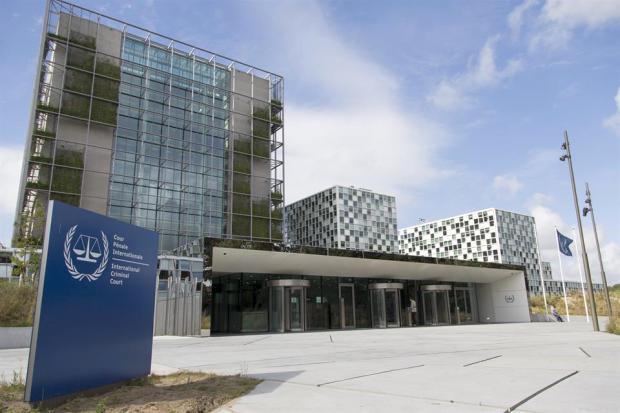Palestinian foreign minister asks ICC to investigate Israel

The International Criminal Court in The Hague, The Netherlands (Photo from the ICC website)
THE HAGUE, Netherlands — The Palestinian foreign minister arrived at the International Criminal Court on Tuesday to call on prosecutors there to open an immediate investigation into Israel’s settlements in the Palestinian territories.
According to a Palestinian statement, the so-called “referral” that Riad Malki is handing to the court’s prosecutors underscores “that there is sufficient compelling evidence of the ongoing commission of grave crimes to warrant an immediate investigation.”
Malki was accompanied by a police escort and ushered into the ICC in The Hague, Netherlands, where he was met with staffers at the door. He did not say anything to reporters upon entering.
The ICC has been conducting a preliminary probe since 2015 into alleged crimes in the Palestinian territories, including Israel’s settlement policy and crimes allegedly committed by both sides in the 2014 Gaza conflict. Tuesday’s referral could speed up a decision on whether to open a full-blown investigation that could ultimately lead to the indictment of high-ranking Israelis.
“The Referral covers past, present, and future Israeli actions to promote, expand, and entrench the settlement regime, perpetrated by, or with the assistance of, the government of Israel or its agents and accomplices in the occupied territory of the State of Palestine, including East Jerusalem,” the Palestinian statement said.
Article continues after this advertisementThe move comes with Israeli-Palestinian relations at their lowest point in years in the aftermath of the U.S. Embassy move to Jerusalem and bloodshed on the Gaza border, where Israeli fire has killed dozens of protesters.
Article continues after this advertisementIsrael has said it was defending its border and accuses Gaza’s ruling Hamas militant group of endangering civilians by using the protests as cover to try to carry out attacks.
Israel is not a member of the ICC, but its citizens can be charged by the court if they are suspected of committing crimes on the territory or against a national of a country that is a member. The ICC has recognized “Palestine” as a member state.
While the ICC can indict suspects, it has no police force and has to rely on cooperation from member states to enforce arrest warrants.
Palestinians likely chose to take the settlement question to the court first as it appears the strongest case. In 2004, the United Nations’ highest judicial organ, the International Court of Justice, ruled in an advisory opinion that the settlements breached international law.
While the International Court of Justice and ICC are separate courts, the ICJ’s rulings are considered strong legal precedents that can be taken into account by the ICC.
Diana Buttu, a former legal adviser to the Palestinian Authority, described the settlements case as a “home run.”
Buttu said the ICJ ruling buttresses Palestinians claims.
“The ICJ was only an advisory opinion. But that being said, it was the opinion of the highest international law court,” she said. “It’s a different court than the ICC, but it’s an international law court. And they came out very firmly. They said these settlements are illegal. All of them are illegal.”
Under international law it is illegal to transfer populations out of or into occupied territory.
Israel claims the land where it has built settlements is not occupied, because it was captured from Jordan, not the Palestinians, and Jordan does not make a claim to the territory. Since the Palestinians never ruled the West Bank, Israel says this territory is disputed and its final status should be resolved in negotiations.
It also claims that settlements can be torn down and therefore do not prejudice the final status of the territory. It notes that in the case of Gaza, for instance, it uprooted all settlements there when it withdrew in 2005.
While the Gaza withdrawal removed some 8,000 settlers, there are now over 600,000 settlers in the West Bank and east Jerusalem – a huge population that would be extremely difficult, if not impossible, to move.